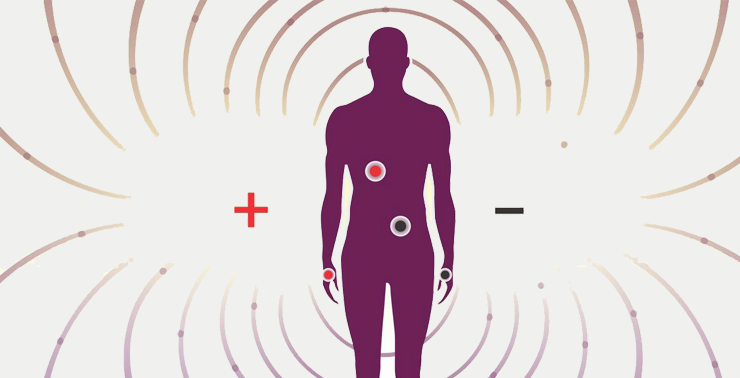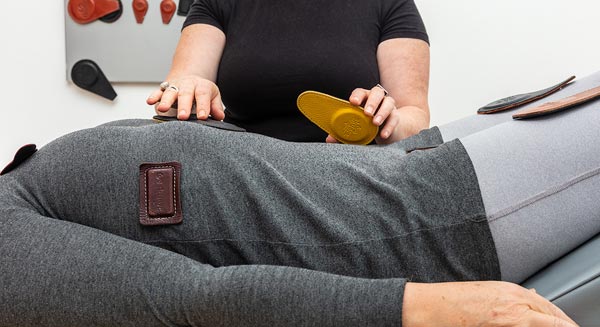Discover the conditions and imbalances that Biomagnetic Pair Therapy supports.
Biomagnetic Pair Therapy or Biomagnetism is a complementary therapy technique developed in 1988 by Dr. Isaac Goiz. The goal of Biomagnetic Pair therapy is to help rebalance the local pH and the body’s bioelectrical environment by placing pairs of medium-strength magnets on specific areas or points of the body. Many Biomagnetic Pair therapists believe that many symptoms are linked to tissue areas that have become too acidic or too alkaline and that by correcting the imbalance it will support the body’s natural self-regulating processes.
Practitioners of Biomagnetic Pair therapy believe that two points on the body “resonate” together, usually one leaning toward acidity, the other toward alkalinity, to form a biomagnetic pair. By applying opposite magnetic poles across the pair it is thought to help neutralize pH extremes, making it less hospitable for pathogens (viruses, bacteria, fungi, parasites) to survive. It is also believed that this eases stress on tissues, glands, and immune function. Over the years, many hundreds of pairs have been mapped on the body through clinical practice and have recorded in a list that biomagnetic therapists refer to while preforming a scan session,
BMP is used worldwide as a complementary modality. Many practitioners work alongside or in addition to conventional medical therapies and encourage clients to maintain relationships with their primary and specialty providers. Mainstream health organizations also advise against using magnet-based therapies as a substitute for appropriate medical evaluation, especially for ongoing pain or suspected illness.
Because BMP is used in holistic and integrative settings, clients commonly pursue it for a wide range of concerns. The categories below reflect reported practitioner use cases—not proven medical claims. Evidence quality varies; in many areas it remains preliminary, anecdotal, or mixed. Sources represent practitioner descriptions and emerging discussions in the field.

Pain and Inflammation
Biomagnetic Pair therapy sessions are frequently sought for back pain, arthritis discomfort, fibromyalgia symptoms, headaches, and general pain states. Practitioners view magnetic pairing as a way to calm stressed tissues and support circulation and pH balance; some clients report subjective relief.
Immune & Infection Support
Many biomagnetism practitioners apply pairs associated with microbial burden—bacterial, viral, fungal, or parasitic—on the theory that normalizing tissue pH makes these organisms less viable. BMP is sometimes integrated into broader wellness approaches for recurrent infections or immune stress.
Digestive & Gut Imbalances
Clients with bloating, IBS-type complaints, gastritis, or reflux often explore BMP. Pair protocols targeting gut-related organ zones are used in an attempt to rebalance acidity/alkalinity and microbial terrain.
Autoimmune & Inflammatory Conditions
Some integrative practitioners report using BMP alongside medical care for autoimmune issues (e.g., rheumatoid arthritis, lupus) to support immune regulation and symptom management. These uses are complementary and should not replace prescribed therapies.
Hormonal & Metabolic Support
Session protocols sometimes focus on glands (thyroid, adrenals, reproductive organs) and metabolic complaints such as blood sugar or weight regulation, again framed as terrain and energetic support rather than direct hormone replacement.
Emotional & Stress Regulation
Practitioners occasionally use BMP pairings to help calm the nervous system and support mood when clients report stress, anxiety, or low resilience. Reports are experiential; formal study is limited.
Energy, Fatigue & Recovery
Clients dealing with chronic fatigue, post-illness weakness, or general low vitality sometimes experience BMP as restorative. Practitioners attribute perceived benefits to improved internal balance and reduced physiological stress load.
Neurological & Sensory Complaints (Supportive)
Biomagnetic pair is used adjunctively for migraines, neuropathy sensations, and head-injury recovery support in some holistic settings. Evidence is early; so client-reported outcomes vary.
Respiratory & Sinus Support
Protocols for sinusitis, asthma support, or chronic congestion appear in practitioner materials; these are positioned as complementary terrain balancing, not emergency care.
Adjunctive Support in Complex or Chronic Illness
Some clinicians working in integrative settings incorporate Biomagnetic pair as part of multi-modal care for chronic degenerative or infectious conditions (e.g., diabetes complications, Lyme-like symptoms, recovery phases). These uses are experimental and should be coordinated with licensed medical providers.
Other conditions that Biomagnetic Pair Therapy can help include:
- Allergies
- Acne
- Arrhythmia
- Fibromyalgia
- Gastritis
- Back Pain
- PMS
- Heartburn
- Meningitis
- Sexual disorders
- Glandular Dysfunctions
- High Cholesterol
- Sinusitis
- HIV
- Chronic Fatigue
- Anemia
- Psoriasis
- Diabetes
- Alzheimer’s
- Reflux
- Rheumatism
- Parasites
- Parkinson’s
- pH Unbalance
- Infertility
- Poor Circulation
- Emotional Issues
- Sciatica
- Cancer
- Fungus
- Asthma
- Migraines
- Flu
- Carpul Tunnel
- Arthritis
- Varicose Veins
- Tennis Elbow
- Autism
- Ulcers
- Low Libido
- Pulmonary Disorders
- Attention Deficit Disorder
- Stress
- Hepatitis
- Anxiety
- Chronic Pain
- Crohn’s disease
- Skin Disorders
- Adrenal Fatigue
- Impotency
- Depression
- Tendonitis
- Digestive Disorders
- Energetic Unbalances
- Ulcerative colitis
- Menopause and PMS Symptoms
Most practitioner cases and research sources report that appropriately used therapeutic magnets are well tolerated. Still, certain groups should exercise caution. Avoid or get qualified guidance before using magnets if you have implanted electronic devices (e.g., pacemakers, insulin pumps), are pregnant, or are undergoing intensive medical treatment (chemotherapy, acute unstable conditions). Always consult your health provider and do not delay medical evaluation for serious symptoms.



